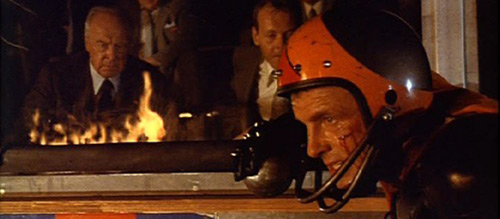I can’t help but feel that the current state of media & publishing can be compared to a 1970’s science fiction movie plot – films that pit the individual vs "the system," such as:
- Logan’s Run
- THX 1138
- Star Wars
- Silent Running
- Soylent Green

Perhaps my favorite of these offers an interesting look into the current state of publishing and media. Rollerball features an incredible and understated performance by James Caan as a hero in a culture that crushes them.
The basic gist of the movie is that corporations now rule the world, people have leisurely nice lives, and the major entertainment to distract the masses is a game called Rollerball. The downside is that this game serves as a symbolic ritual to "demonstrate the futility of human effort." It is a game so hard, so changing, that "it’s not a game man is supposed to grow strong in."
James Caan’s character excels at the game, and must challenge the corporation’s efforts to end his career. As everyone around him tries to convince him that it is best for everyone – best for the order of things – for him to abide by the rules and retire early, he comes to this conclusion:
"There aren’t any rules at all."
He realizes that the privileges given to the masses by the corporation are meant to buy them all off – that it is a system that keeps the corporation powerful and in charge. The citizens choose comfort over freedom.
And it’s kind of interesting to consider the current state of media in this regard. That powerful entities who had previously been able to control the flow of information and creativity are now finding themselves being usurped by the masses – Individuals have been empowered to create and distribute content essentially without cost.
This change has unleashed a tidal wave of creativity and has blurred lines of ownership, copyright and fair use. While the RIAA sues music fans, and courts try to outlaw linking to newspaper articles, the masses have realized that the rules they have been playing by for decades no longer apply.
From a publishing & media perspective, you see the affects of this extending beyond the typical "journalists vs bloggers" debate. Here are just a few recent examples:
- Chris Anderson using content from Wikipedia in his book.
- Twitter being used as unnamed sources in CNN news coverage.
- The Washington Post selling access to people of power.
And this shift is taking place broadly across media channels:
- Music.
Of all media, music is closest to my heart, and I find it ironic to see people listening to more music than ever before, even as the music industry itself collapses. While revenue models may still be emerging, artists are finding more and more opportunities to expose their art to the world. It has been a slow evolution in the past decade for record labels, as complicated layers of middlemen each struggle to find their value in a changing world. - TV
Content creators and cable operators have to continue to deliver value to their affiliates & local stations, even as they experiment with online distribution that cuts out those more traditional channels. A sports organization like Major League Baseball may want to further spread their content to fans, but they also need to "protect" profitable but exclusive relationships with media entities. - Radio
Local stations now face competition through subscription services and online radio access and services such as Pandora. How royalty fees apply to each has offered constant threat to new services that music fans love. - Newspapers
How is a blogger different than a journalist, and how does paper differ from a screen? These are some of the many questions that underlie a huge shift not just in behavior, but power. In the past decade, we now have access to more information than ever before, and it is largely free. Are newspapers a public service that needs to be saved by an outside hand, or is it simply an outdated business model? - Movies
I don’t have much to say here… I still love movies in their form and function, though do appreciate the immediacy of Netflix instant viewing and Redbox DVD rentals. - Magazines
Where to begin. I love magazines… such a brilliant package – I cling to my issues of The New Yorker each week. I spend a lot of time considering the fate of business-to-business magazines, and the underlying purpose of these brands. I can’t help but feel that their audiences are being well served with digital media – and that we are in the process of a huge change, where advertising and customer behavior and value is shifting. Not from good to bad or bad to good, but from useful to more useful.
What if you free the content from the medium? You are left with news as an event, not a product on paper; music as creativity flowing through the air instead of a shrinkwrapped cd; movies as an experience rather than an admission ticket.
Consider this definition of minimalism:
Purpose that is not corrupted.
I am fascinated with this concept. What about a brand that could better serve the needs of their customers, but do so while taking in less revenue. Have they corrupted their purpose?
When we think about how established systems react to a changing environment, an inherent reaction is "protection." From the perspective of the "system," if their structure fails, somehow, society fails. But the real question is: is this a failure of value, or a failure of power?

Extending these concepts to another cinematic struggle brings us to a more recent movie: The Dark Knight. As the Joker rails against the structure of society, he posits his belief system in describing what is wrong with people currently in charge of things:
"Their morals, their code… it’s a bad joke. Dropped at the first sign of trouble. They’re only as good as the world allows them to be… when the chips are down, these civilized people… they’ll eat each other… [They are] schemers trying to control their worlds… [I’ll] show the schemers how pathetic their attempts to control things really are."
And in a pivotol scene when the established power players have lost all control, and demand to have it back, the joker shares with them what they fear most:
"You have nothing to threaten me with, nothing to do with all your strength."
And such is the state of media in 2009. Media is still valued, journalism is still valued, credible third-party news outlets are still valued – but their hold on the reins of power has loosened. It’s a bittersweet moment at best, but one filled with opportunity.
It is not that the old way of doing things did not give great benefit to our culture. Clearly, traditional media has and continues to deliver these benefits. But it is also clear that the future affords us new possibilities that are about things greater than whether you read the news on paper or screen.
Perhaps R.E.M. said it best when describing the end of the old way of doing things:
"Offer me solutions, offer me alternatives and I decline . It’s the end of the world as we know it, and I feel fine."

“Some men just want to watch the world burn.” In The Dark Knight, the Joker is akin to the pundits who claim the “wisdom of the crowds” and FREE is the future; few of them really care about the end result as long as it keeps them in the spotlight and the speaking gigs rolling in.
I'm conflicted by the “us vs. them” frame this discussion is so often presented in, where traditional media companies are the bad guys and the “struggle” is a zero-sum game. As if new media players aren't simply exploiting a moment of transition, working an angle to maximize their own profits.
Does anyone believe that The Huffington Post is an altruistic enterprise dedicated to freeing us from the exploitative grip of… The New York Times? Or that we'll all be getting our news from Twitter by 2012?
Guy – Thanks, you make some great points. I think what is most interesting to me is someone like Craig Newmark who seems to have a genuine interest in simply helping people through Craigslist. The Twitter folks seem to take the same position, but their service is still so new, that there is still a wait-and-see approach to where they take things.
To your point – there are really no sides, and the playing field is littered with folks advocating things that benefit themselves. And yet, it is all in transition, and even the new players need to create real value in order to find fans.
The transition in print media seems to have a huge amount of polarizing pundits – which is why I like looking at how things are shaping up in the music industry. Whenever I see an artist reach their fans in a small and direct way that supports the art – that supports their love of music and their ability to have the artist continue producing it – well, that's what makes me smile.
Have a nice day.
-Dan